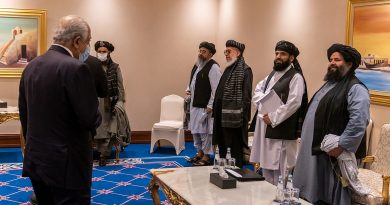Department of War: A Mistake More than just Words
Elijah Novak
Staff Writer
https://www.gettyimages.com/detail/news-photo/kirsten-a-davies-nominee-to-be-chief-information-officer-of-news-photo/2235539376?adppopup=trueOn September 5 2025, the White House announced Executive Order 14347: Restoring the United States Department of War. This action marks a complex change in the international and domestic political scenery of the United States. It signifies internationally, the change of the long-lasting narrative of American ideals. Words and their connotations speak volumes, and questioning the legitimacy behind American action may lead to the loss of international prestige.
War at its most basic construction is an exchange of violent action between two sides, in pursuit of a goal. Secretary of War Pete Hegseth stated that with the name change comes a revival of the “warrior ethos.” In addition to this, he began to list a number of juxtapositions including “maximum lethality, not tepid legality” and “violent effect not politically correct” reported NBC. Interpreting the language used by the Secretary of War opens up speculation around our objectives, so traditionally held as the American ideals of peace, international stability, freedom, and democracy. If the Cold War taught the world anything, it is that fear and a pride in violence does not lead to domestic or international peace. The long debate about the US influence to help support and maintain a global social order-through diplomacy, trade, or defensive interventions – appears to be compromised by the language of “war” and its “maximum lethality, not tepid legality.” Ideals can be witnessed, protected, inspired, and sustained through other methods than “war.” If you need an offensive war to institute the good, you are not instituting the good. For those questioning if this way of thinking is too idealistic, we may focus on the oath of office taken by the military to “support and defend the Constitution of the United States against all enemies foreign and domestic.” “Supporting and defending” have less synchronicity with “war” than with “defense.” War is often and should be the last choice. At its core the oath of the armed forces is anchored in the law of the land. The Constitution, while not perfect, is continually evolving in pursuit of a more perfect union.. We should focus on the defense of the Constitution, rather than seeking out war.
As Americans, we usually identify war-like rhetoric with other, aggressive countries, but not our own. When we use words like “war” in a governmental setting, we are using rhetoric similar to that of Russian President Putin. In his invasion of Ukraine in 2022, Putin referred to the United States, as an “empire of lies,” and as a “con artist” who forcefully uses its ideals as a method of influence, reported The New York Times. Putin’s rhetoric is aggressive, blunt, and direct. The world’s negative response to Putin’s action shows the international consequences of aggressive rhetoric. Words matter, and aggressive words tend to stay longer in the ear than more peaceful ones. If U.S. defense forces are sent in on a peace-keeping mission, it seems odd that the mission for peace and stability is under the auspice of the Department of War. There is a reason why the U.S. Air Force bases in our allied countries do not call those locations Air “Force” Bases, but rather air bases. “Force” implies imposition, rather than collaboration. The legitimacy of the United States lies in our rhetoric of peace and stability.
Another consideration of the change from “defense” to “war” may be from the taxpayer. The renaming of the Department of War does more damage to the U.S.’s military industrial complex, then good. For Trisha Bannerjee & Nathanial Zetter at the Los Angeles Times, the Department of War signifies the truth of America’s long violent history. The department’s new name “cuts through the rhetoric America has used for decades to claim that it is defending peace even as it continuously wages wars.” Bannerjee and Zetter argue that pulling back the “defense” veil to reveal the bluntness of “war”may finally make the U.S. taxpayer open their eyes that how we fund aggressive military buildup and actions. America never has been stingy with defense budgets by any measure of international comparison or domestic slices of the tax spending. The U.S. Department of Defense has not seen a funding decrease as significantly as other government departments. Anti-war movements are common, anti-defense movements are not. Spending on defense is easier to sell for politicians than spending on war. By renaming the Department of Defense the Department of War, the United States government may spur an awareness among the citizens that taxes are going to “war” and not preparing for “defense.” Perhaps beyond taxes, the words “defend and support” more align with the disposition of the U.S. citizens who hold ideals that are worth protecting as part of our identity, rather than a war which we would threaten to prosecute.
Image courtesy of Getty Images.


